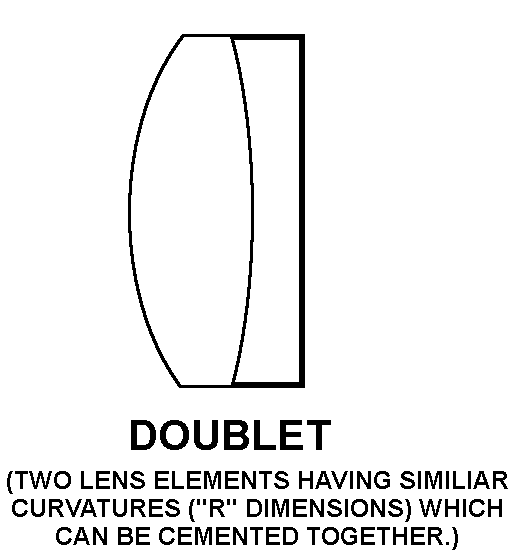6650009029740
Price Quote Get an up to date pricing and availability quote for this product. Order online or over the phone.
Quality Commitment
Serving our customers with quality and safety first.
- AS9120 Certified
- Audited supply chain
- ITAR Registered
- DDTC Registered
- HAZMAT Certified
- Customer service objectives
- Every product 100% inspected

6650-00-902-9740 Specification Set by the OEM (see RNCC code 3)
1.266in.
0.362in.
0.250in.
6.626in.
6.385in.
6.023in.
1.6200 and 1.6490
60.300 and 33.800
doublet
double convex and PLANO-Concave
3.690in.
1.651in.
glass optical
MIL-G-174, class 1, grade c mil spec single material response
periscope, tank, XM48
Cross Reference Parts Part numbers that meet the specification outlined on this page and set by the OEM
Identification Item Identification Guide (IIG) and Item Name Code (INC)

Definition Definition of approved item name (AIN): "LENS,OPTICAL INSTRUMENT"
An unmounted, transparent, color free lens which may be treated with a low reflection coating to increase light transmission. Includes single and compound elements. For items having two plane parallel surfaces, see window, optical instrument. Excludes reticle, optical instrument.
Packaging & Dimensions Packaging instructions, special markings, and approx. weight/dims
Packaging Codes
OPI: Optional Procedure Indicator Code. A one position alpha code that indicates the allowable deviations from the prescribed requirements.
SPI No.: Special packaging instructions number.
LVL A/B/C: Indicates the type of shipping container required for level A, B, or C maximum packing protection.
SPC Mkg: A two position code that identifies the special markings applied to the container, which is part of the total pack to protect the contained item during preservation, packing, storage, transit and removal from the pack.
6650-00-902-9740 Material Hazmat, Precious Metals, Criticality, Enviroment, and ESD
Indicates there is no data in the hmirs and the nsn is in a fsc not generally suspected of containing hazardous materials.
Item does not contain precious metal.
Represents items with no adp components
The item does not have a critical feature such as tolerance, fit restrictions or application. nuclear hardness properties have not been determined (not valid for input).
Identification Codes
HMIC: Hazardous Material Indicator Code. A one position code that identifies a hazardous item.
PMIC: Precious Metal Indicator Code. A one position code which identifies items that have precious metals as part of their content. precious metals are those metals generally considered to be uncommon, highly valuable, and relatively superior in certain properties such as resistance to corrosion and electrical conductivity.
ESD: Electrostatic Discharge. Indicates if an item is susceptible to electrostatic discharge or electromagnetic interference damage. electrostatic discharge damage occurs when an accumulation of static electricity generated by the relative motion or separation of materials is released to another item by direct contact. electromagnetic interference damage occurs when an item comes into proximity with an electrostatic or magnetic field.
ENAC: Enviromental Attribute Code. Identifies items with environmentally preferred characteristics.
CRITL: Criticality Indicator Code. Indicates an item is technically critical by tolerance, fit, application, nuclear hardness properties, or other characteristics.






